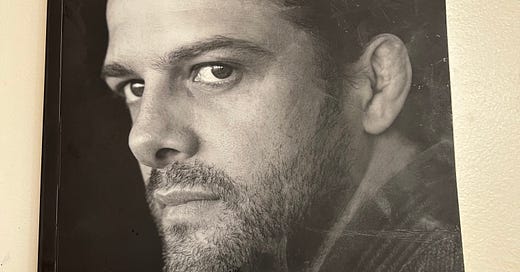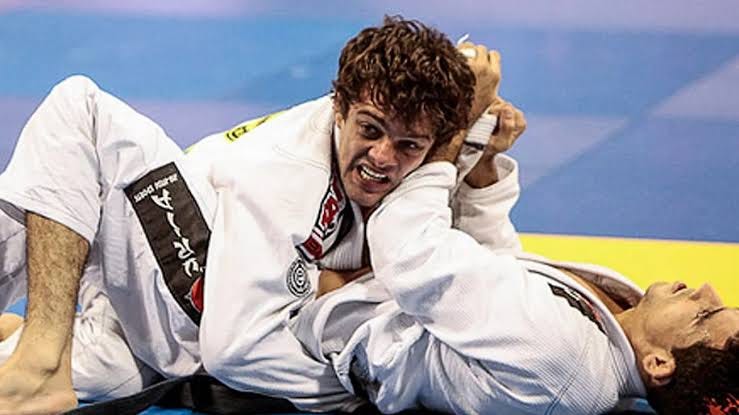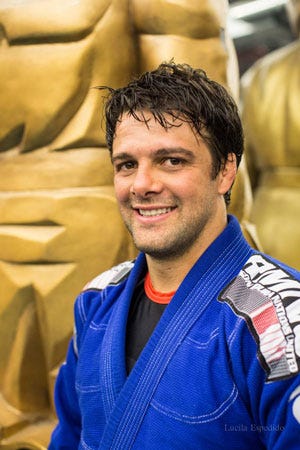Robson Moura is a 5-time Brazilian Jiu-Jitsu world champion (1997-2000, 2007). At 10 years old, he started training BJJ in Teresópolis, Brazil. He received his BJJ black belt at the age of 16.
This was an interesting book about a pioneer in BJJ. A small fighter at 5 foot 5 inches tall competing most of his career as a light featherweight, which is weight limit of under 140 pounds. Almost all of his competition career happened before I had started training BJJ in 2007.
The book chronicles his time growing up in a favela (shanty town) in Brazil, finding BJJ at 10 years old, becoming a black belt by 16, and his challenges as a Brazilian living in the USA.
Robson Moura was an awesome competitor who now dedicates his life to teaching his students and his family, which I can relate to.
Robson Moura was born in 1978. The area he grew up in Teresópolis was a very poor slum town about an hour north of Rio. Lots of poverty and violence. Robson describes seeing dead bodies in the street and almost being shot while he was very young. His parents worked very hard but life was very difficult for the Moura family.
At 10 years old Robson was inspired by Bruce Lee movies and wanted to be a martial artist. His father told him about a “Brazilian martial art” but Robson had never heard of Brazilian Jiu-Jitsu up to that point. Initially loved it but he was told that he was too young to start BJJ. There were no other kids at the school. Thankfully another kid wanted to start at the same time as Robson and his BJJ journey began.
The book covers a lot of his early years. He tells a funny story about being excited to get his first gi (kimono uniform) from his parents, and realizing it was a karate gi, not a BJJ gi. The material is much thicker for a BJJ gi. It was two years later until his parents could afford to buy him a proper BJJ gi. Robson was so thrilled with it that he slept in his new gi that night.
Robson had good success in his early BJJ competitions. He was used to training with much bigger adults so he found fighting kids his size much easier. After a few tournaments he quickly earned a sponsorship from a car dealership and kept winning and earning money.
Robson describes one scary situation when he was 15 years old. He wanted to skip BJJ training one Friday night and go to a party. His BJJ coach, Jucaão knew about the party and did not want Robson to go. He went anyway.
The next day at class Jucão called out Robson and beat him down on the mat. Being very rough. Smacking and even biting Robson. It sounded terrible and I can’t believe someone would do that to a student. Let alone a 15 year old kid. Jucão sucks.
Robson was scared for his life in that moment and cried. Jucão’s wife was there and begged him to stop. All of this to “teach him a lesson”.
Robson Moura represented team Nova Uniao (Portuguese for “New Union”) for most of his career. This team was created by Andre Pedeneiras. Andre was a black belt under Carlson Gracie. Carlson Gracie was one of the founding members of the Gracie Family and one of their best fighters. Andre received Carlson’s blessing to create his own team, which was very rare back in those days to receive that type of special permission to create a new team.
The original Nova Uniao brought together a few different teams together to train as one. Politics with Gracie Barra team caused Robson’s original BJJ coach Jucão who was a Gracie Barra black belt to move away and leave Nova Uniao. Due to logistics Robson Moura was now living and training at Nova Uniao headquarters in Rio.
Robson had his own BJJ school by the time he was 16 years old. At that point he had been training for 6 years. In 1996, Carlos Gracie Jr. organized the International Brazilian Jiu-Jitsu Federation (IBJJF). Major tournaments would now be organized in Brazil.
The first IBJJF World Championships was held in 1996. Robson won the purple belt adult male rooster weight (under 126 pounds) category. He was immediately promoted to brown belt.
Technically by IBJJF rules you must be 18 years old to be a brown belt and 19 years old before you can be awarded a black belt. Robson was winning everything, training for hours everyday. He was so talented his coaches broke the rules and promoted him early.
As he entered his 20’s Robson got married to his wife, Alessandra. He moved a few times trying to make a living through teaching BJJ. He heard about the Gracie family doing well in the USA. Robson wanted to move to the USA to live the American dream.
With the help of a sponsor Robson first visited the USA in 1995 for the IBJJF Pan American Championship in Los Angeles, California. He became so homesick that he bailed on seminars he was supposed to attend after the tournament in Las Vegas.
There was a few separate times Robson describes bad experiences teaching in the US. Gym owners wanting him to come teach but not booking a return ticket, paying him less than what was agreed, leaving him with little to no resources in a country he does not speak the English language.
Robson ended up settling in Tampa, Florida where he opened a school. Robson Moura Brazilian Jiu-Jitsu Academy. Eventually creating his own team, Robson Moura Nations United (RMNU) with affiliates around the world in Canada, Germany, France, England, Ireland, and Brazil.
Personal connection
Ryan Hall vs. Robson Moura ADCC 2011
In a way I helped one of Robson’s opponents, Ryan Hall. After meeting Ryan Hall at a BJJ tournament in Montreal in 2010, he was impressed with me and invited me down to train with him in Virginia, USA. He asked me to be apart of his ADCC 2011 training camp. I went for a few weeks of training at Ryan’s gym. It was an awesome experience. Soaking up all this knowledge from one of the world’s best grapplers.
Ryan won his first ADCC match and in the second round would meet BJJ legend…Robson Moura. It was wild watching this live. “I helped him get ready for this”. I remember thinking. Robson ended up winning by points but it was an incredible match.
You Skipped a Robson Moura Seminar?
If you didn’t know, there’s a gym in Dartmouth , Nova Scotia (Fit Plus MMA) that used to be affiliated under Robson Moura. So that means once or twice a year Robson would come to Fit Plus for a seminar and to do some belt promotions.
One time, he was around for the yearly Fit Plus BJJ Tournament. They offered the winner of the open weight division free admission to the Robson Moura seminar the next day. I won the open weight division. I was excited to go to the seminar.
But I was young (in my early 20’s) and I went out to party and chase girls with all my teammates that night in downtown Halifax. I never made it to the seminar. I was surprised when I searched on YouTube and found some clips from that actual seminar! Look closely and you will see some Nova Scotia BJJ mainstays in this video. Click the link below to watch.
Robson Moura Seminar in Dartmouth, NS
Bonus. Here are a few stories from the book I felt were memorable/relatable I wanted to share with you.
On belt promotions
“In the old days (1980’s-2000’s) belt promotions were very difficult to receive. A student was not promoted to blue belt until he could beat all the other white belts and even some of the blue belts in the class. Often the instructor would want the white belt to win a tournament before promotion. Tournaments were heavily factored into belt promotions.
What makes one belt better than another?
On any given day a black belt could get submitted and lose to an athletic blue belt. Does this make him not a black belt? Not at all. Every belt and every student is different. Each belt has different challenges that become very individual for the person.”
On scary instructors
Robson describes one scary situation when he was 15 years old. He wanted to skip BJJ training one Friday night and go to a party. His BJJ coach, Jucaão knew about the party and did not want Robson to go. He went anyway.
“The next day at class I knew something was up. And then the unthinkable happened. He called me to the mat and beat me down. He was so rough with me. Down right mean. He smacked and even bit me. I started to cry. His wife was there and she begged him to stop. I was so scared.
He stopped and roared, “Never do that again. Don’t you ever miss class again!”
After class, Jucão drove me back to my house and told my father what he did on the mats. In shock, my father told Jucão he had his permission to give me a beating on the mat anytime I stepped out of line. I could not believe my dad told him it was OK.”
“Nobody can choke me out”
One night while hanging out with his girlfriend and future wife, Alessandra Robson boldly stated that “nobody can choke me out”. Meaning BJJ chokes had no effect on him. Both Robson and his girlfriend were 16 year old purple belts at this time.
On her parent’s bed Alessandra put Robson in a triangle choke submission. Robson went completely unconscious. Alessandra had never choked someone completely unconscious before so she thought she had killed her boyfriend.
Screaming for help her entire family ended up running into the room to see what was going on. Alessandra started to shake Robson. Sometimes you have a bit of amnesia when you come to. “See, nobody can choke me out” he said. His ego was checked that day.
Car wreck - 1999 Worlds
While driving to Rio to compete in the IBJJF World Championships Robson, his wife Alessandra, and two of his young students (Ricardo “Demente” Abreu and Rodrigo Ribas) were involved in a car wreck.
Robson describes driving on the highway trying to pass a large truck. The truck was overloaded and began to move into Robson’s lane. He went off the road and the car flipped upside down landing in a ditch.
Rodrigo was thrown out of the car and hit his head. He still somehow managed to go and help the others. Someone passing by called an ambulance and they all went to the hospital.
Despite this Robson still went to Rio by bus. He describes reliving the crash over and over in his mind and worrying about having to deal with his insurance company. Still he won his division at the world championship, the day after a car wreck.
The most important belt in BJJ
“I call blue belt the “don’t give up belt”. It’s the most important belt because blue belt is the time when you have all these techniques in your mind and you’re trying to figure out what your game is going to be. Am I going to be a top player or am I going to be a bottom game player?
It’s a big turnover point because so many people quit once they reach a blue level. It’s when students decide if they’re going to make jiu-jitsu their life or not. I think instructors need to spend a lot of time with their students and counsel them through the promotion so that the students understands where they started from where they are now, and where the journey of jiu-jitsu can take them. Blue belt is also one of the most frustrating belts for, when a blue belt starts to understand the journey they either experience confusion, determination, or despair.
It is a turning point for most people when they realize what jiu-jitsu means and the commitment necessary to jiu-jitsu to progress. So often excuses and other commitments in students life start to take over but once you battle through the blue belt and the purple belt jiu-jitsu will be there for you for the rest of your life.
Yes, the questions and challenges will continue but jiu-jitsu is much more than just throwing your opponent back-and-forth or grabbing someone’s neck and choking it, the underlying technique takes years to understand and develop and refine.”
Please follow the writer Josh Presley on Instagram, YouTube, TikTok & Facebook @PresleyBJJ for daily BJJ content, and tune into The Great Canadian BJJ Show Podcast on Spotify or the podcast app. PresleyBJJ.com






